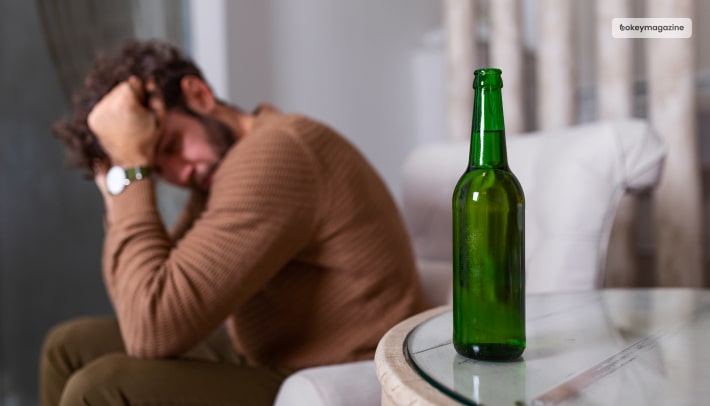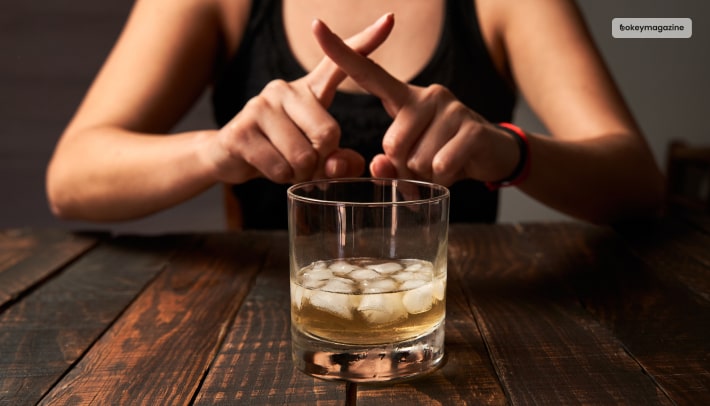
Is It Okay To Binge Drink Once A Week?
In the United States, there are about 136 million alcohol consumers. More than 47% of those users claimed to have binge-used in the previous month.
Adult Americans report binge drinking four times per month at a rate of about 17%. People who consume alcohol on the weekends frequently engage in binge drinking.
The days from Thursday to Saturday account for up to 63% of all alcohol consumption.
Due to the potential for consuming a large number of alcoholic drinks in a short period of time, binge drinking can be even riskier than heavy drinking. Six pints of beer or 10 small glasses of wine are considered one unit.
The NHS recommends a weekly maximum of 14 units. According to recent studies, if you binge drink once a week, you can nearly double your risk of developing health issues.
Let us answer this question in further detail— is it okay to binge drink once a week?
Understanding The Concept Of Binge Drinking

According to the CDC, one in four American adults who binge drink had at least eight drinks on a binge event.
The usual definition of binge drinking, which is four or five drinks consumed in a single session, is exceeded by that sum.
High alcohol intake can have immediate and long-term negative health effects, such as liver damage and addiction.
This level of alcohol intake is alarming because it increases the likelihood that drinkers may experience health issues like pancreatitis, liver cirrhosis, and some forms of cancer.
Male individuals between 18 and 34 most frequently often binge drink once a week. It can also result in severe accidents and injuries.
As it is linked to a higher risk of several chronic and acute illnesses, such as different forms of cancer, stroke, liver disease, and heart disease, binge drinking is a severe public health problem.
Additionally, it has a number of psychological and social negative effects, including aggression, injury, unintended pregnancies, suicide attempts, and even death.
Binge Drink Once A Week- Risks

Alcohol is a depressant that reduces bodily activity. Although it is broken down in the liver, it impacts several other physiological systems. The more alcohol you consume, the more powerful its effects become.
You are still ingesting significant amounts of alcohol, even if you just binge drink once a week.
Short Term Risks

Your weekly binge drinking sessions can have the following short-term effects:
⦿ Painful hangovers (dehydration, nausea, and pain the next day after excessive drinking) (dehydration, nausea, and discomfort the next day after binge drinking).
⦿ Sudden blackouts (inability to recall anything that happened while intoxicated) (inability to remember anything that happened while you were drunk).
⦿ Violent conduct.
⦿ Greater potential for accidents.
Long Term Risks

When you binge drink once a week, it indicates that you frequently consume heavy amounts of alcohol. Large quantities of alcohol can seriously impair essential biological functioning over time.
A higher risk of: is associated with binge drinking.
⦿ Types of throat, breast, and liver cancer
⦿ Liver illness (such as hepatitis)
⦿ Liver injury (cirrhosis)
⦿ Hypertension (high blood pressure) (high blood pressure)
These consequences can potentially be fatal in some cases. Binge drinking contributed to almost 40,000 alcohol-related fatalities between 2011 and 2015.
Signs To Know That Your Drinking Is Becoming A Problem

According to experts, there are certain signs that you must recognize truthfully to avoid having a drinking problem—
When You Use Alcohol As Your Coping Mechanism

It’s not always indicative of a drinking issue to say that you like a glass of wine by yourself. When drinking by yourself develops into a habit, or when it is paired with using alcohol to improve your mood, there is a problem.
It’s crucial to evaluate the issue and take into account how your drinking habits may affect your life if you discover that you are always craving more alcohol or require it to get through a challenging scenario.
Overindulging in alcohol, or even if you binge drink once a week, may negatively affect your physical, mental, and emotional well-being and your relationships with friends and family.
It’s critical to recognize when your drinking has become troublesome since alcoholism is a severe condition.
According to Dr. Bulat, using alcohol as a coping strategy is harmful and may also signify a deeper issue.
You Behave Differently Under Alcohol Influence

The quantity of alcohol you consume influences whether you could develop a drinking problem.
However, the real problem is how alcohol affects you. Consideration must be given to both the quantity ingested and the effects of alcohol.
This is because they are less able to regulate themselves and make sane judgments, which increases the likelihood that they may get addicted.
A crucial first step in preventing the emergence of more severe issues is identifying and dealing with the warning indications of alcohol misuse.
You should assess your drinking and how it’s impacting you if it leads you to act in ways that are inconsistent with your morals or better judgment.
When drinking, drinking-related memory loss or total blackouts should be taken seriously.
When It Becomes Growingly Difficult To Stop Or Avoid Consumption

Try restricting yourself to one or two drinks if you’re worried about the amount of alcohol you’re consuming or its harm to your health.
Alternatively, go a step further and completely cut out drinking, even for a short while.
This will allow your body time to recover and maybe undo any adverse effects you may have encountered. You might also utilize this time to consider and evaluate your relationship with alcohol.
For many people who believe that their drinking is becoming problematic, taking a vacation from it is a crucial first step.
It also aids in helping you evaluate your connection with alcohol and consider how drinking could affect your life.
According to Dr. Bulat, there could be a problem if quitting drinking makes you feel defensive.
What Happens When Underage Drinkers Start Binging?

Compared to adults, teens who binge drink may be a greater risk group. The brains of adolescents between the ages of 12 and 17 are still growing.
Binge drinking often throughout this period can alter how the brain develops. Long-term consequences of these modifications might include decreased impulse control and increased risk-taking.
Even in adulthood, binge drinking in adolescence has been related to memory, learning, and concentration issues.
Even if drinking ceases after puberty, these issues could persist. Adolescent binge drinkers are more likely to experience despair and anxiety, which can negatively impact daily living.
The Bottom Line
Alcohol use disorder, which covers various chronic drinking issues, including alcohol addiction, does not include binge drinking.
Some individuals might binge drink once a week and think it is safer than regular drinking.
The possible hazards of excessive drinking to one’s bodily and mental health are, however, ignored by this view.
Some claim that excessive alcohol use increases your chance of developing conditions, including heart disease, diabetes, and stroke.
Others contend that consuming no more than one drink each day, such as one glass of wine, can lower your risk of developing these issues. Although this could be the case, alcohol can still be harmful in high doses.
Similar to moderate drinking, binge drinking requires ingesting a lot more alcohol than moderate drinking does.
The hazards of binge drinking outweigh any possible advantages when your blood alcohol concentration (BAC) is 0.08 percent or higher.
Alcoholism can have several harmful effects, including decreased judgment, blackouts, permanent brain damage, and addiction.
Read Also:



















Post Your Comment